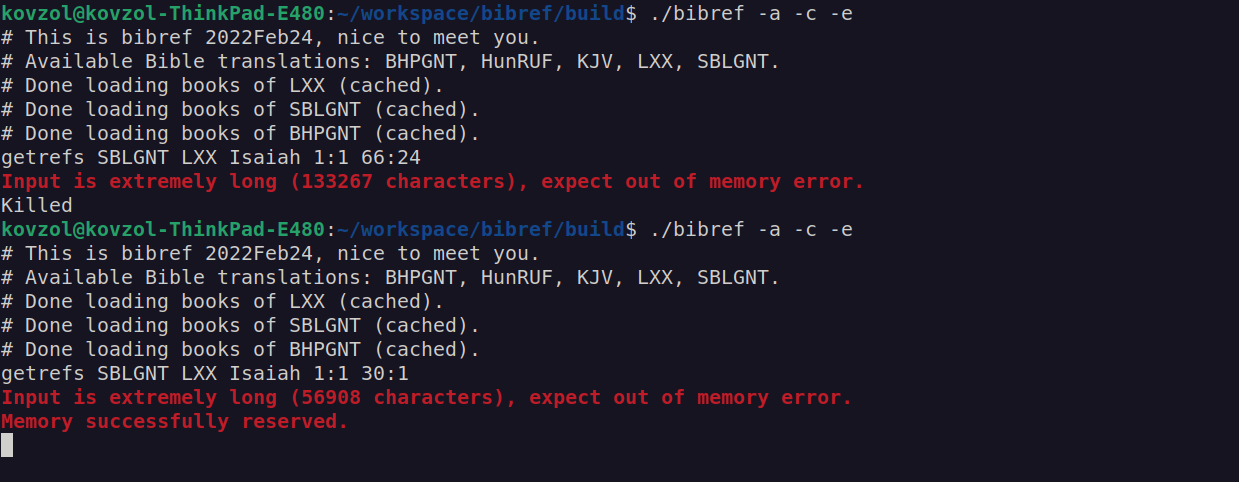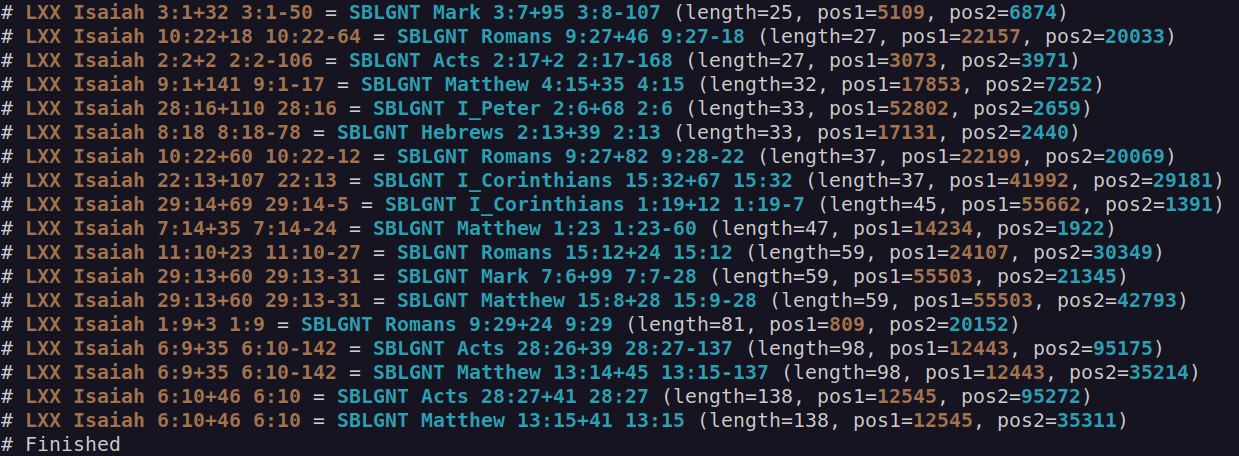31 July 2022
Isaiah, a second summary
Today I worked again on the bibref database by trying to finalize the entries in Isaiah.
The approach I followed was the study of the output of the getrefs algorithm for the command line
getrefs SBLGNT LXX Isaiah 1:1 66:24. One should not try this – it requires
too much memory, so you will almost certainly encounter an out of memory error.
Instead, breaking the task into smaller pieces will do the work. On my machine (it is a 2018 Lenovo ThinkPad
with 32 GB RAM) I needed a split by two: I checked the first 29 chapters, and then the rest.
I used the native version of bibref since the web version is terribly slow for such scenarios, even if you split the input into more
pieces.


(The web version can obtain the same results, but the recommended split size is at most one chapter.
If you decide to reproduce my results via the web version, click here
and enter the appropriate commands
for each chapter respectively, e.g. getrefs SBLGNT LXX Isaiah 1:1 2:1, and then
getrefs SBLGNT LXX Isaiah 2:1 3:1, and so on. Each chapter will require a couple of minutes to process.)
My research question was if the getrefs algorithm
delivers false positives for the long matches or not.
The longest matches come from Isaiah 6:9 (and they are quoted in Matthew 13:14 and Acts 28:6).
The outcome is: All search results until length 37 were not just potential quotations but real ones. This is good news:
Long matches seem to be a warranty that they are indeed quotations.
The first long match that is not a real quotation (in my terms, at least) is Isaiah 22:13 that seems
to be mentioned by Paul in I_Corinthians 15:32. It is of length 37, but the text does not mention that
here an Old Testament passage is quoted. Such texts could be identified as strong allusions.
(See Sung Kuk Kim's 2013 PhD thesis for more information.)
Surprisingly, I found some results that were identified as acceptable positives. They are
Isaiah 40:4-5 (lengths 64 and 34),
55:10 (length 28) and
2:2 (length 27).
Meanwhile I found three false positives:
Isaiah 45:16 (length 28), 66:14 (length 27) and 3:1 (length 25). I stopped my research at this point,
because under the length of 25 more and more false positives can occur.
In a former entry on Psalms I learned that
matches with lengths over 50 are always real quotations, but below 40 they are sometimes just allusions.
Today's work confirmed this: the longest match in Isaiah which belongs to a non-real quotation is 37 characters long.
In the Psalms the similarly defined length is 34, it is in 86:9, and it matches with Revelation_of_John 15:4, which is
usually identified as a strong allusion. (Here one can insist that the quoted text in Rev 15:4 is introduced
with the word “οτι” (“for”), and for Galatians 3:11 and I_Peter 5:5 the same situation was decided pro quotation.
Thus it seems to make sense to identify Psalm 86:9 as a quoted passage in Rev 15:4. But the context explains that
Rev 15:3-4 is a quotation from another song, “song of Moses the servant of God, and the song of the Lamb”,
and Psalm 86 differs in its most parts from Rev 15:4. Hence Rev 15:3-4 must be
a different song, even if there are matching parts of it with Psalm 86 and other passages, e.g. Psalm 119.)
Here is the current list of real quotations, quoting passages from Isaiah:
It was automatically generated with the command make ot-Isaiah-table.pdf from the
work-in-progress database of bibref.
Note that the table has some new entries compared to the table being communicated earlier:
2:2, 53:4 and 55:10 have been added, and an ABPGRK entry
of 53:12 is inserted. In fact, this last entry
is very uncertain since the beta version of the statistically restored Greek New Testament
chose that this verse was not present in the original version of the Bible!
Entries on topic internal references in the Bible
- Web version of bibref (12 January 2022)
- Order in chaos (17 January 2022)
- Reproducibility and imperfection (20 January 2022)
- A student of Gamaliel's (23 January 2022)
- Non-literal matches in the Romans (26 January 2022)
- Literal matches: minimal uniquity and maximal extension (31 January 2022)
- Literal matches: the minunique and getrefs algorithms (1 February 2022)
- Non-literal matches: Jaccard distance (2 February 2022)
- Non-literal matches in the Romans: Part 2 (3 February 2022)
- A summary on the Romans (5 February 2022)
- The Psalms (6 February 2022)
- The Psalms: Part 2 (7 February 2022)
- A classification of structure diagrams (15 February 2022)
- Isaiah: Part 1 (19 February 2022)
- Isaiah: Part 2 (26 February 2022)
- Isaiah: Part 3 (2 March 2022)
- Isaiah: Part 4 (7 March 2022)
- Isaiah: Part 5 (15 March 2022)
- Isaiah: Part 6 (23 March 2022)
- Isaiah: Part 7 (30 March 2022)
- A summary (7 April 2022)
- On the Wuppertal Project, concerning Matthew (17 July 2022)
- Matthew, a summary (25 July 2022)
- Isaiah, a second summary (31 July 2022)
- Long false positives (23 August 2022)
- A general visualization (25 August 2022)
- Stephen's defense speech (19 September 2022)
- Statistical Restoration Greek New Testament (31 July 2023)
- Qt version of bibref (11 March 2024)
- Statements on Bible references (5 August 2024)
- Statements on Bible references: Part 2 (2 January 2025)
- Statements connecting LXX and StatResGNT (23 January 2025)
- Deuterocanonical books in the bibref project (5 February 2025)
- Update to LXX 3.0: Part 2 (7 February 2025)
- An allusion on Palm Sunday (29 March 2025)
- Module LXX can be upgraded from 3.0 to 3.2 just with little pain (14 August 2025)
- bibref: German language support (23 August 2025)
- Statement diagrams based on LXX 3.2 (24 December 2025)

|
Zoltán Kovács Linz School of Education Johannes Kepler University Altenberger Strasse 69 A-4040 Linz |